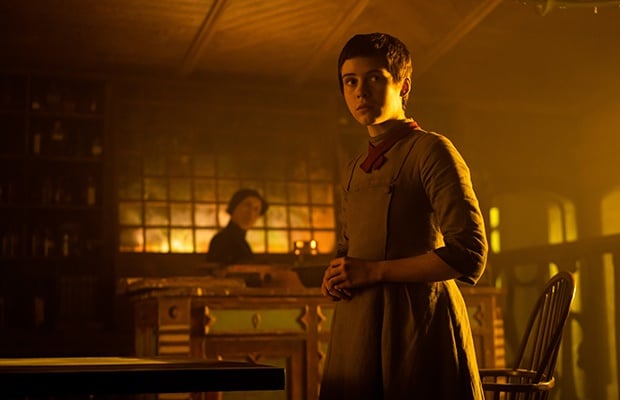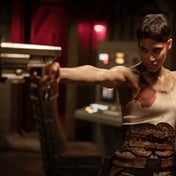
WHAT IT'S ABOUT:
A reimagining of the famous Grimm fairy tale, forced to leave their dangerously mentally ill mother behind, Gretel, a sixteen year old girl, and her eight year old brother, Hansel, head off into a shadowy forest in search of employment and food. When they stumble across an old cabin in the woods, it seems like all their prayers have been answered. The mysterious old crone who lives there may seem a bit shady but as she offers them a place to stay and a never-ending supply of opulent food so the desperate siblings decide to stay with her – at least temporarily. As time goes on, though, it quickly becomes clear that the old lady is a lot deadlier and more sinister than they could possibly have imagined.
WHAT WE THOUGHT:
The famous story of Hansel and Gretel coming across a cabin made of sweets only to find that in the house lives a witch who uses the allure of the candy to fatten up children to eat is a brilliant allegory for what is now called “stranger danger” and, despite its grizzly nature, it has impressively been “Disney-fied” significantly less than most of the Brother Grimm’s Fairy Tales. The problem with adapting it to screen, though, is that the simple elegance by which it delivers its message means that there’s not enough story to see it through even a fairly brief feature-length movie.
What writer, Rob Hayes, and director, Oz Perkins, have done with bringing the story to screen as Gretel and Hansel, then, is far more drastic than simply changing the names around. Though, even that is not as straightforward as it seems. No doubt, a bunch of internet trolls are, even as we speak, whinging about “SJWs” ruining everything with their feminism and blah blah blah. They’re horrible idiots, of course, but in this case, they’re not, technically speaking, entirely wrong.
Gretel and Hansel isn’t so much a generically feminist take on the old fairy tale as one that has completely subverted the message of the original – and, thus, the basic plot and character-focus as well. Gretel is mentioned first in the title because, in this version, she is significantly older than her brother (they’re normally depicted as similarly-aged prepubescents, but here Gretel is sixteen and Hansel only eight-years-old) and the story has become less about kids not trusting strangers than about an adolescent girl coming to grips with her femininity – though, with bits of the old Stranger Danger message sprinkled in for good measure.
This particular wicked witch is no longer just a foe for our heroes to turn the tables on but has been recast as a warped reflection of what Gretel may become should she make the wrong decisions at this critical juncture in her life. Hansel is still an important figure here, but his role is specifically subservient to the two women at the centre of the film- which is probably for the better as Samuel Leakey’s wandering accent is a bit of a distraction (though considering how regionally unspecific the film is, I don’t know why they saddled the young actor with it in the first place).
All that said, what’s the result of all this tinkering with a very old classic? The answer, somewhat unsurprisingly, is that Gretel and Hansel is very much a mixed bag, but a very interesting one at that.
On the negative side of things, the story has none of the minimalist effectiveness of the original, but it’s still far too threadbare to entirely carry the film. The characters too are just on the wrong side of being fully fleshed out, even as Leakey, Alice Krige and, most especially, Sophia Lillis (who has been building on her breakthrough in Stephen King’s IT nicely) give it their all. On a purely narrative level, then, the film just isn’t that compelling. And, frankly, its subtext is just a bit too muddy to work on that level either.
The good news, though, is that however unimpressive the film may be on paper, experientially, it’s a whole other matter. It’s glacially paced, yes, but this is all in service of creating a real sense of atmosphere and a mounting unease that is unmatched by most horror movies. It does have a couple of lame jump scares but the film is far better at subtle creepiness that, when it’s at most surreal, even has some slight echoes of David Lynch. The most impressive thing, though, is the persistently hellish atmosphere that manifests in “regular people” that are always just a little off and a clammy claustrophobia that is as present in the expanses of the forest as it is in the witch’s increasingly unnerving cabin.
All this makes for something that comes close to feeling like an arty student-film at times but, aside for those few misjudged attempts at conventional scares, it doesn’t feel like just another paint-by-numbers horror film or yet another pointless remake of an old fairy tale. It’s flawed to pieces but when you have something like Brahms: The Boy II on the one side and, oh I don’t know, Snow White and the Huntsman on the other, it’s a total breath of fresh – if slightly sulphuric – air.
WATCH THE TRAILER HERE:




 Publications
Publications
 Partners
Partners











